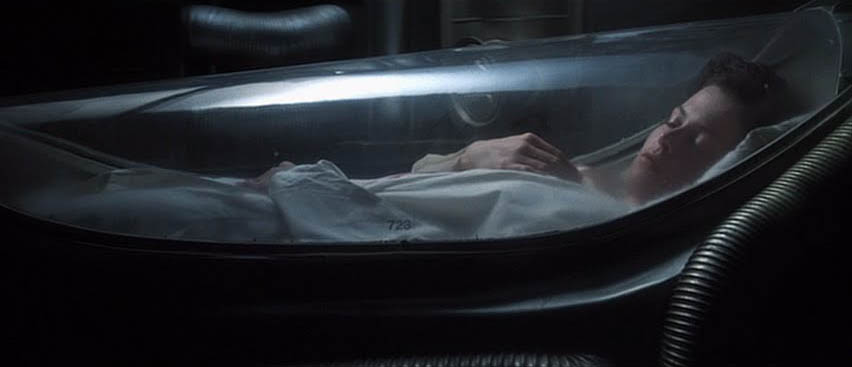Return to LV-426 with Stephan Mathieu’s Before Nostromo

“Oh! that my young life were a lasting dream!
My spirit not awakening, till the beam
Of an Eternity should bring the morrow.
Yes! tho’ that long dream were of hopeless sorrow,
‘Twere better than the cold reality
Of waking life, to him whose heart must be,
And hath been still, upon the lovely earth,
A chaos of deep passion, from his birth.”
– Edgar Allan Poe
Of what do we dream before life-changing trauma? Do our subconscious fears manifest as ghouls to torment us while our brains lie in thrall to REM sleep cycles? Do we find ourselves running through greener pastures, remembering halcyon days long washed away like tears in the rain? Do we think of the future and the life-shattering events about to unfold?
Ridley Scott’s 1979 science-fiction horror film Alien is a powerful examination of the human condition, one that juxtaposes the peace of the inner subconscious against the violent reality of nature. In its opening scene, the crew members of the commercial spacecraft Nostromo are sleeping peacefully in stasis, perhaps dreaming of loved ones or joyful memories back home on Earth, before the violent alarm claxon of their onboard computer MOTHER awakens them regarding a distress signal from a wrecked ship on the barren planetoid LV-426. The joy of discovery and the alluring mystery of the unknown beckon the crew to the puzzling ruins of an alien vessel. It is on that vessel that the crew unwittingly obtains a violent stowaway, one that, like a gnawing stress, insidiously creeps into their waking dreams and transforms them into nightmares.
Stephan Mathieu’s erudite electronic composition, a commissioned sound pavilion piece entitled Before Nostromo, is an investigation into these dreams before they succumb to the violent terror of the bloodthirsty intruder. Composed on piano, gong, and shortwave radio filtered through tape loops and other electronic manipulation, this homage to the sonic landscape of Alien plumbs the depths of Morpheus’s realm as the intrepid crew of the Nostromo hurtle toward the lurking fate that awaits them on LV-426. Split into nine tracks, the composition explores the sleeping thoughts, emotions, fears, and aspirations of each of the stasis-bound passengers on the doomed ship as well as the final violation of the xenomorph in the ninth track.
Each track is masterfully constructed to imbue a dream-like fuzziness and blur to the entire album; shimmering electronics manifest for some passengers, such as Ripley, in the form of a warm embrace. For others, like Dallas, the droning whir and insectile tappings convey a sense of anxiety. Each track takes you to a deep place of contemplation as you being to wonder, and indeed experience, how each crew member felt leading up LV-426. Does the android Ash, whose dream manifests as a cold, cyclical whir accented by a cascade of dropping keys, speculate as to what it would mean to be human, to feel desire and guilt and shame and jealousy and betrayal? Beneath the flickering keys that burn like distant stars, does the cold precision of the ambiance and the undercurrent of crackling static hint at the treachery to come? Perhaps Ash, like Conrad’s erstwhile Nostromo, was corrupted by the dream of a different, better life.
Mathieu’s composition is a deeply cerebral work, one that burrows into the recesses of your mind, planting seeds for you to discover upon your next journey through the gates of slumber. It is a multi-faceted and elegant work, much like the xenomorph itself; it’s all smooth contours and feminine curves punctuated by violent, yet subtle acts of aggression and malice. The ill intent, like our deepest fears and regrets that eventually manifest in dreams, rarely lingers on the surface of this music. Instead, like the xenomorph it lurks beneath shadowy key shifts and seething textures. Even the album art, what appears to be some sort of stone headdress, is a work of finesse and craftmanship that belies a violence in the edges. The power of this work lies not in its bravado and immediacy but in the cold tension it creates. Its menace, and indeed beauty, as there is something beautiful in the primal allure of bestial aggression and survival, is in the way it slowly baptizes you into a deeper state of slumber, unearthing your deepest fears and tensions long after you believed them dead and gone.
In this head-space, no one can hear you scream.
Before Nostromo was commissioned by ZKM | Institute for Music and Acoustics Karlsruhe for their 46.12 channel sound pavillon The Morning Line, presented here as a dedicated stereo mix with an additional coda. You can purchase it in a lossless digital format on Bandcamp or acquire it in vinyl format from Mathieu’s own Schwebung platform.









